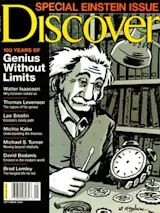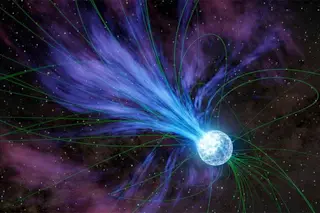Albert Einstein got it wrong. Not once, not twice, but countless times. He made subtle blunders, he made outright goofs, his oversights were glaring. Error infiltrated every aspect of his thinking. He was wrong about the universe, wrong about its contents, wrong about the workings of atoms. Yet Einstein’s mistakes could be compelling and instructive, and some were even essential to the progress of modern physics. “Most scientists would give their eyeteeth to make even one of Einstein’s mistakes,” says theoretical physicist Fred Goldhaber of the State University of New York at Stony Brook.
But they were still mistakes. In 1911 Einstein predicted how much the sun’s gravity would deflect nearby starlight and got it wrong by half. He rigged the equations of general relativity to explain why the cosmos was standing still when it wasn’t. Beginning in the mid-1920s, he churned out faulty unified field theories at a prodigious ...














